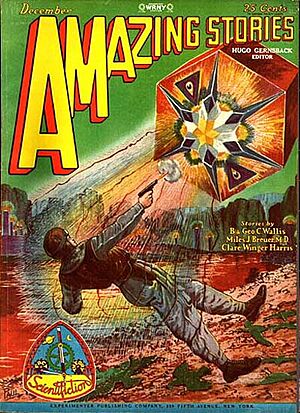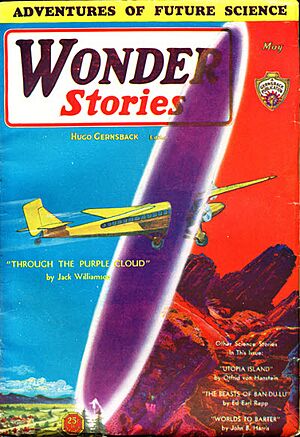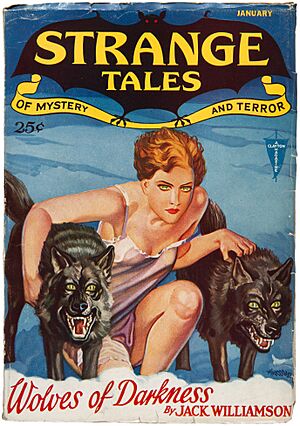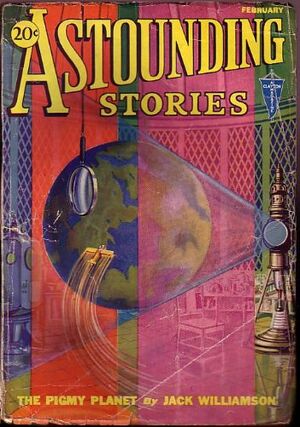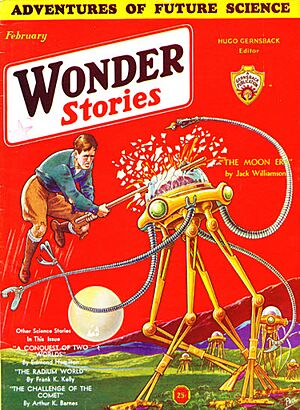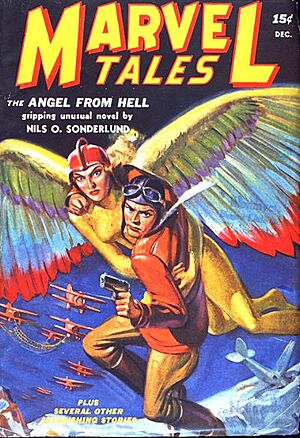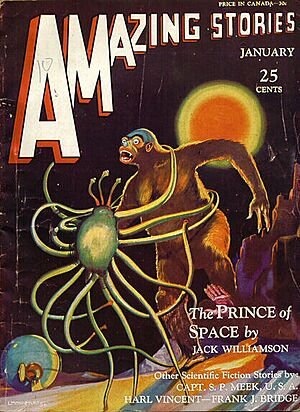Jack Williamson facts for kids
Quick facts for kids
Jack Williamson
|
|
|---|---|
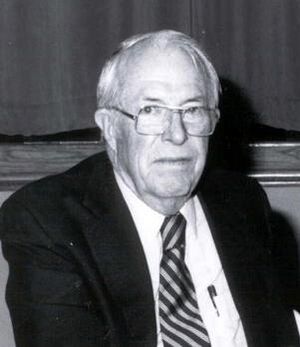 |
|
| Born | John Stewart Williamson April 29, 1908 Bisbee, Arizona Territory, U.S. |
| Died | November 10, 2006 (aged 98) Portales, New Mexico, U.S. |
| Pen name | Will Stewart Nils O. Sonderlund |
| Occupation | Writer, professor of English |
| Period | 1928–2006 |
| Genre | Science fiction |
John Stewart Williamson (born April 29, 1908 – died November 10, 2006) was an American science fiction writer. He wrote under the name Jack Williamson. Many people called him the "Dean of Science Fiction" because he was so important to the genre. He also helped create the term genetic engineering, which means changing living things using science. Sometimes, he used other names like Will Stewart and Nils O. Sonderlund for his stories.
Contents
Early Life
Jack Williamson was born in Bisbee, Arizona, on April 29, 1908. For his first three years, he lived on a ranch in the Sierra Madre Mountains in Mexico. Later, his family moved to western Texas.
In 1915, his family traveled to rural New Mexico in a covered wagon to find better land for farming. When farming became too hard, they started ranching, which his family still does today near Pep. During World War II, he served in the U.S. Army Air Corps as a weather forecaster.
Writing Career
As a child, Williamson loved telling stories to his brother and two sisters. When he was older, he found a magazine called Amazing Stories. He started writing his own stories and sold his first one, "The Metal Man," at age 20. It was published in December 1928.
He also worked with Miles J. Breuer, a doctor who wrote science fiction. Breuer helped Williamson make his stories more realistic and exciting. Their first book together was Birth of a New Republic. This story was about Moon colonies fighting for freedom, similar to the American Revolution.
In the 1930s, Williamson became a well-known science fiction writer. Even a young Isaac Asimov was excited to get a postcard from him! Williamson wrote for many "pulp magazines," which were cheap magazines printed on rough paper.
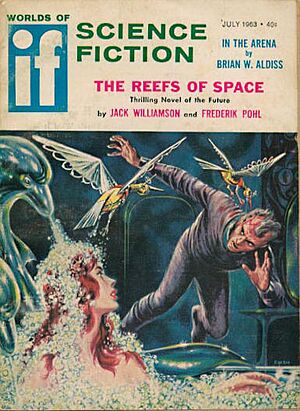
From 1954 onwards, Williamson wrote many science fiction novels with Frederik Pohl. These included the Jim Eden, Starchild, and Cuckoo series.
Williamson kept writing even when he was over 90 years old. He won important awards like the Hugo Award and Nebula Award late in his life. He was the oldest writer to win these awards.
Academic Career
In the 1950s, Jack Williamson earned his Bachelor's and Master's degrees in English from Eastern New Mexico University (ENMU). He started teaching there in 1960 and stayed connected to the university for the rest of his life.
He gave many books and original writings to ENMU's library. This led to the creation of the Jack Williamson Science Fiction Library, which is now one of the best science fiction collections in the world. ENMU also holds the Jack Williamson Lectureship Series every year, where famous authors give talks. The university's Liberal Arts building is named after him.
Williamson also earned his PhD in English literature from the University of Colorado. His studies focused on the early works of H.G. Wells.
Terms Coined
Jack Williamson is famous for creating several words that are now commonly used:
- He coined the word terraforming in a science fiction story published in 1942. Terraforming means changing a planet to make it more like Earth.
- He is also credited with one of the first uses of the term genetic engineering in his 1951 novel Dragon's Island.
- The word psionics first appeared in his story The Greatest Invention in 1951. Psionics refers to powers of the mind, like telepathy.
Later Years
In 1976, the Science Fiction Writers of America named Williamson its second Grand Master of Science Fiction. This is a very high honor for science fiction writers.
Even after he retired from full-time teaching at ENMU, he continued to co-teach classes like "Creative Writing" and "Fantasy and Science Fiction."
In 1994, Williamson received a World Fantasy Award for his lifetime achievements. In 1996, he was inducted into the Science Fiction and Fantasy Hall of Fame. He also won the Bram Stoker Award for Lifetime Achievement in 1998 and was named Grand Master in 2004.
Jack Williamson passed away at his home in Portales, New Mexico, in November 2006, at the age of 98. He had just published a new novel, The Stonehenge Gate, in 2005.
Two minor planets, 5516 Jawilliamson and 235281 Jackwilliamson, are named in his honor.
Legion of Space Series
Jack Williamson created his popular Legion of Space series by combining ideas from famous books. He took the idea of a group of heroes, like in The Three Musketeers, and added a funny, clever character like John Falstaff from Shakespeare.
The first book, The Legion of Space, was published in 1934. It became very popular. The story is set in a future where humans live throughout the Solar System. They are afraid to travel to other star systems because the first trip to Barnard's Star ended badly. The survivors came back changed and spoke of evil aliens called the "Medusae."
The Medusae are huge, four-eyed, flying creatures with many tentacles. They communicate using microwave codes. In the story, a criminal named Giles Habibula, who can open any lock, joins two brave warriors, Jay Kalam and Hal Samdu. They are part of the Legion, which is the military and police force of the Solar System. They fight the Medusae, who want to destroy all humans and take over the Solar System.
The Medusae use a special gas that harms humans and powerful plasma weapons. The Legion has a secret weapon called AKKA, a force field that can make anything disappear. This weapon was used to defeat the Medusae and even made their Moon base vanish.
Williamson wrote more books in the series:
- The Cometeers (1950): The same heroes fight a new alien race made of energy. These aliens control a "comet" that is actually a giant force field holding many planets with their slaves.
- One Against the Legion (1967): A villain tries to conquer the Solar System using stolen teleportation technology. In this future, robots are against the law.
- The Queen of the Legion (1983): This is the final book in the series, featuring Giles Habibula again after the Legion has been disbanded.
Works
Series
- Legion of Space Series
- The Legion of Space (1947)
- The Cometeers (1950)
- One Against the Legion (1967)
- Three from the Legion (1980; includes the first three novels)
- The Queen of the Legion (1983)
- Humanoids Series
- "With Folded Hands" (1947)
- The Humanoids (1949)
- The Humanoid Touch (1980)
- The Humanoids / With Folded Hands (1996; includes both)
- Seetee series
(Written as Will Stewart)
- "Collision Orbit" (short story, 1942)
- Seetee Shock (1949)
- Seetee Ship (1951)
- Seetee Ship/Seetee Shock (1971, includes both)
- Undersea Trilogy (with Frederik Pohl)
- Undersea Quest (1954)
- Undersea Fleet (1956)
- Undersea City (1958)
- The Undersea Trilogy (1992; includes all three)
- Saga of Cuckoo (with Frederik Pohl)
- Farthest Star (1975)
- Wall Around A Star (1983)
- Starchild Trilogy (with Frederik Pohl)
- The Reefs of Space (1964)
- Starchild (1965)
- Rogue Star (1969)
- The Starchild Trilogy (1977; includes all three)
Novels
- The Girl from Mars (1930, with Miles J. Breuer)
- The Green Girl (1930)
- Golden Blood (1933)
- Xandulu (1934)
- The Blue Spot (1935)
- Islands of the Sun (1935)
- Reign of Wizardry (1940)
- Darker Than You Think (1948)
- Dragon's Island (1951; also known as The Not-Men)
- Star Bridge (1955, with James E. Gunn)
- The Dome Around America (1955)
- The Trial of Terra (1962)
- Bright New Universe (1967)
- Trapped in Space (1968)
- The Moon Children (1972)
- The Power of Blackness (1975)
- Brother to Demons, Brother to Gods (1979)
- Manseed (1982)
- Lifeburst (1984)
- Firechild (1986)
- Land's End (1988, with Frederik Pohl)
- Mazeway (1990)
- The Singers of Time (1991, with Frederik Pohl)
- Beachhead (1992)
- Demon Moon (1994)
- The Black Sun (1997)
- The Fortress of Utopia (1998)
- The Silicon Dagger (1999)
- The Stone from a Green Star (1999)
- Terraforming Earth (2001; Co-winner of 2002 John W. Campbell Memorial Award)
- The Stonehenge Gate (2005)
Collections
- The Legion of Time, and After World's End (1952)
- The Pandora Effect (1969)
- People Machines (1971)
- The Early Williamson (1975)
- The Best of Jack Williamson (1978)
- The Alien Intelligence (1980)
- Millions de Soleils (1988)
- Into the Eighth Decade (1990)
- The Prince of Space/The Girl from Mars (1998)
- The Collected Stories of Jack Williamson, Volume One, The Metal Man and Others (1999)
- The Collected Stories of Jack Williamson, Volume Two, Wolves of Darkness (1999)
- The Blue Spot, and Entropy Reversed (Released Entropy) (2000)
- The Collected Stories of Jack Williamson, Volume Three, Wizard's Isle (2000)
- Dragon's Island and other stories (2002)
- The Collected Stories of Jack Williamson, Volume Four, Spider Island (2002)
- Seventy-Five: The Diamond Anniversary of a Science Fiction Pioneer (2004)
- The Collected Stories of Jack Williamson, Volume Five, The Crucible of Power (2006)
- In Memory of Wonder's Child (2007)
- The Worlds of Jack Williamson: A Centennial Tribute (1908–2008) (2008)
- The Collected Stories of Jack Williamson, Volume Six, Gateway to Paradise (2008)
- With Folded Hands… And Searching Mind, The Collected Stories of Jack Williamson, Volume Seven (2010)
- At the Human Limit, The Collected Stories of Jack Williamson, Volume Eight (2011)
Short Stories
- The Metal Man (1928)
- The Cosmic Express (1930)
- The Meteor Girl (1931)
- The Lake of Light (1931)
- The Doom from Planet 4 (1931)
- The Moon Era (1931, 1932)
- The Pygmy Planet (1932)
- Salvage in Space (1933)
- Born of the Sun (1934)
- Star Bright (1939)
- The Angel From Hell (1939; as Nils O. Sonderlund)
- Hindsight (1940)
- Collision Orbit (1942; as Will Stewart)
- Minus Sign (1942; as Will Stewart)
- Opposites—React! (1943; as Will Stewart)
- With Folded Hands... (1947)
- The Man from Outside (1951)
- Beans (1958)
- A Planet for Plundering (1962)
- The Masked World (1963)
- Jamboree (1969)
- The Highest Dive (1976)
- The Humanoid Universe (1980)
- The Firefly Tree (1997)
- The Pet Rocks Mystery (1998)
- Eden Star (2000)
- The Ultimate Earth (2000; won the Hugo for Best Novella in 2001)
| Title | Year | First published in | Reprinted in |
|---|---|---|---|
| Afterlife | 2002 | F&SF | Year's Best SF 8 |
Autobiography
- Wonder's Child: My Life in Science Fiction. (1984, 2005)
|
See also
 In Spanish: Jack Williamson para niños
In Spanish: Jack Williamson para niños
 | Dorothy Vaughan |
 | Charles Henry Turner |
 | Hildrus Poindexter |
 | Henry Cecil McBay |


